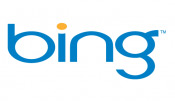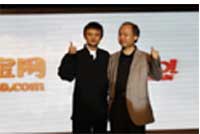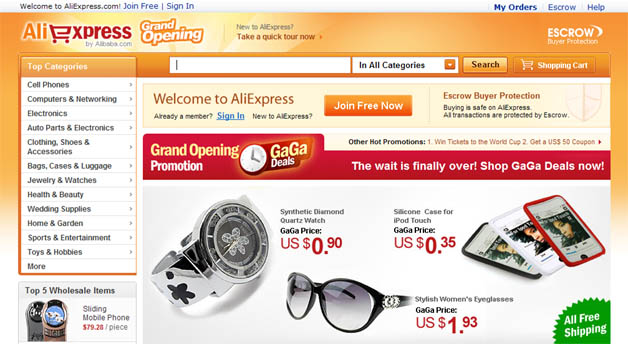Acer was set to unveil a new smartphone last week, but the launch was reportedly postponed after Google expressed concerns with the operating system, developed by Alibaba, and apparently based upon Android.
Google has always painted Android as an open platform, but this philosophy has had its share of critics. That “openness” debate has come back into the spotlight as a result of the Acer phone situation.
Google’s point of view in this case is that Alibaba’ s Aliyun operating system, while built upon Android, is not compatible with the rest of the Android ecosystem, and that’s a problem, as the company sees it.
“When we first contemplated Android and formed the Open Handset Alliance, we wanted to create an open virtuous cycle where all members of the ecosystem would benefit,” says Google’s SVP of Mobile and Digital Content, Andy Rubin, in a blog post. “We thought hard about what types of external factors could intervene to weaken the ecosystem as a whole. One important external factor we knew could do this was incompatibilities between implementations of Android.”
“Imagine a hypothetical situation where the platform on each phone sold was just a little bit different,” he continues. “Different enough where Google Maps would run normally on one phone but run terribly slow on another. Let’s say, for sake of example, that Android implemented an API that put the phone to sleep for a fraction of a second to conserve battery life when nothing was moving on the screen. The API prototype for such a function might look like SystemClock.sleep(millis) where the parameter ‘millis’ is the number of milliseconds to put the device to sleep for.”
“If one phone manufacturer implemented SystemClock.sleep() incorrectly, and interpreted the parameter as Seconds instead of Milliseconds, the phone would be put to sleep a thousand times longer than intended!” Rubin says. “This manufacturer’s phone would have a terrible time running Google Maps. If apps don’t run well across devices due to incompatibilities, consumers would leave the ecosystem, followed by developers. The end of the virtuous cycle.”
Alibaba’s point of view is that Aliyn is not part of Android or its ecosystem, so it doesn’t need to be compatible. Liz Gannes at AllThings D shares some comments she received from John Spelich, Alibaba’s VP of international corporate affairs.
“Aliyun is built on open source Linux,” he’s quoted as saying. “It has our own applications (e.g. email, maps, etc.) Designed to run Cloud apps designed by parties in our own ecosystem It has the ability to run some but not all Android apps. But it is not an Android fork.”
“It is ironic that a company that talks freely about openness is espousing a closed ecosystem,” he added. “Aliyun OS is not part of the Android ecosystem, so of course Aliyun OS is not, and does not have to be, compatible with Android. This is like saying that because they own the Googleplex in Mountain View, therefore anyone who builds in Mountain View is part of the Googleplex.
He didn’t stop there. Read Gannes’ piece for the entire thing.
Rubin, had the following words for Spelich on Google+:

Hey John Spelich — We agree that the Aliyun OS is not part of the Android ecosystem and you're under no requirement to be compatible.
However, the fact is, Aliyun uses the Android runtime, framework and tools. And your app store contains Android apps (including pirated Google apps). So there's really no disputing that Aliyun is based on the Android platform and takes advantage of all the hard work that's gone into that platform by the OHA.
So if you want to benefit from the Android ecosystem, then make the choice to be compatible. Its easy, free, and we'll even help you out. But if you don't want to be compatible, then don't expect help from OHA members that are all working to support and build a unified Android ecosystem.
The Benefits & Importance of Compatibility
We built Android to be an open source mobile platform freely available to anyone wishing to use it. In 2008, Android was released under the Apache open source license and we continue to develop and in…  815
815  153 Powered by socialditto
153 Powered by socialditto
Both parties make reasonable points, but to me, it seems Alibaba will face a pretty big uphill battle in getting widespread adoption of its own ecoystem, in competition with Android and others on the market.





 815
815  153
153 


 That’s less than encouraging news for Microsoft supporters, since a different representative labeled China "the
That’s less than encouraging news for Microsoft supporters, since a different representative labeled China "the  Google wasn’t much luckier in the search market, either as its market share fell from 24.2 percent to 21.6 percent while Baidu’s share rose to 73.0 percent.
Google wasn’t much luckier in the search market, either as its market share fell from 24.2 percent to 21.6 percent while Baidu’s share rose to 73.0 percent.

 "We are pleased to help Japanese small businesses sell their products to China on our Taobao platform as we believe more choice is a good thing. As a result of this initiative, our respective customers will eventually be able to choose from millions of products from China and Japan," said Jack Ma, chairman and CEO of Alibaba Group.
"We are pleased to help Japanese small businesses sell their products to China on our Taobao platform as we believe more choice is a good thing. As a result of this initiative, our respective customers will eventually be able to choose from millions of products from China and Japan," said Jack Ma, chairman and CEO of Alibaba Group. 